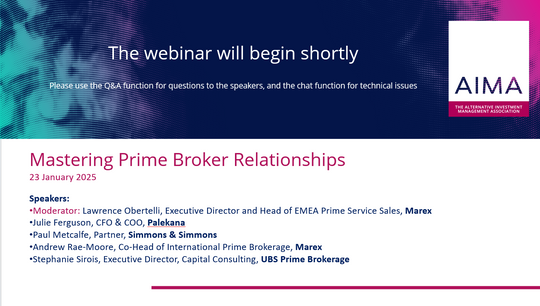Six ways to sharpen your fund’s focus on capital retention
By Lawrence Obertelli, TD Cowen
Published: 14 June 2023
Whether a fund is new or established, attracting capital can be the difference between thriving or barely surviving. But in today’s environment, there needs to be just as much focus, if not more, on a different aspect of the fund-investor relationship. I’m talking here about capital retention.
I recently moderated a panel session on this very subject at the AIMA Next Generation Manager Forum 2023 in London, in which there was a consensus that, given the current challenging environment for capital raising, funds would do well to think about what they’re doing to retain the capital they have already attracted.
In that session, a lot of opinions were shared on the different methods that fund managers could utilise in this area. Here, I share a summary of the six top tips aimed at capital retention.
- Ask questions and listen hard. So often, a fund wants to do a lot of the talking. When meeting with investors, fund executives may be keen to explain their strategies and why they expect to be successful. But it can be just as important to listen. For instance, do you know how your fund might fit into an investor’s portfolio? Why not ask? A solid manager-investor relationship is built on a two-way dialogue. If investors feel they are being listened to, they may be more inclined to want to stick with you, in good times and bad. And it’s not just about making them feel heard. It’s also about understanding what is important to them.
- If you’ve followed Tip No. 1, you should have an idea of what communication channels will work best for your investors. So, be sure to have a clear communication strategy that focuses not just on what gets reported but also how the information gets delivered. Historically, a monthly newsletter alone might have been sufficient. Now there are also videoblogs, webinars, podcasts and all manner of social media-based communication. If you can, provide as much as you can in as many formats as possible, since investors love to have choice in what they consume and where they consume it. But you still have to consider your own bandwidth and in-house skillsets. So, if that’s not practical, just be sure that the formats and channels you select are in sync with what your investors have told you they prefer.
- In line with No. 2, think about both regular reporting and one-off presentations. In the case of the latter, it’s important to consider who is delivering the information. For instance, when conducting an investor presentation on a complex trading strategy, bringing in the experts to explain things and answer questions may make sense. But be careful. Not everyone is born ready for the limelight. Some members of your investment team may need training before meeting with investors. For instance, quants need to be able to explain things for people who don’t necessarily have PhDs or extensive coding experience.
- Avoid bespoke service and automate. This tip is about being both fair and efficient. All investors need to have access to the same information. So, if an investor wants information and it makes sense to provide it on a regular basis, simply add it to what you communicate to everyone. You’ll be treating all your investors equally and you’ll be giving them choice. You don’t need to worry about overcommunicating. Less is not more in this space. And one way to make this workable is to think about automating your reporting wherever possible. Smaller funds in particular need to ensure they don’t saddle themselves with too much manual administrative work.
- Get in front of bad news. There will be times when things are not going well. If you want to improve your chances of hanging on to capital, be prepared to communicate quickly when you need to. That may involve calling each of your investors before hitting them with poor results in a newsletter. And think through the responses to likely questions ahead of time.
- Lastly, do not resist redemptions. These are bound to happen at some point. It’s important to remember that by the time an investor decides to redeem, it’s generally too late to do anything about it. The instinct may be to fight it, but this is not a good idea. Instead, it’s better that the fund understands why the decision was made and focuses on keeping lines open for the future.
We wrapped up our panel discussion by talking about what each executive thought was the key takeaway. Overwhelmingly, the focus was on listening. That’s why I put it at the top of the list. In this business, your ears are often your best weapon. So be ready to use them.
Lawrence Obertelli is a director of prime brokerage sales at TD Cowen. He is based in London.







